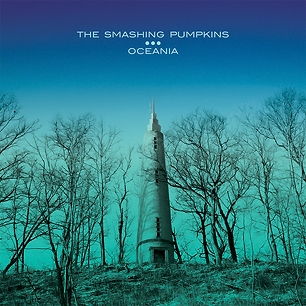Yeah, art. Corgan is that most arty of rockers, fussily putting everything where he feels it belongs, devouring each new toy, letting his work exist as a growing organism. As with most topics, I wouldn't consider myself to be the final word on the subject, but that seems to be a fair assessment. It was what set him apart in the 90s, when alt-rock either meant slashing and burning or being cutesy. I think that when Corgan has met his best success, he has found that narrow path between singular personal vision and crowd-pleasing populism. Go too far toward the former and the music becomes insufferable, the latter it becomes bland. Oceania walks that line for 60 minutes.
The sound of this album is big, wide-open and full. There is always something going on, usually a lot. Even the soft parts are kind of loud and heavy, and usually build to some huge climactic moment. This is an album loaded with musical instruments played like musical instruments, not as vehicles for hooks and solos. There is beauty in that, genuine sincere beauty. Here is an album by a 90s band in 2012 that doesn't sound like it belongs in either time period. What's more, it's a damn cohesive album: each track feels like it needs to be heard after the last. It's weighty, but never a slog to listen through. This is especially ironic given that Corgan has mulled over the idea of abandoning albums and releasing songs each on their own. As it turns out, he does one of the best justifications for the full album statement in the 2010s.
What's key about this album are the vocals and how they do not override the gorgeous symphonics of the music. If you let them, they become part of the sonic palette, his nasal voice a roughened counterpoint to the immaculate instrumentation. The music isn't there to back up the vocals, the vocals follow along, he seems to be singing along to the sounds in his head, and the actual lyrics in there are just to hit the right rhythm and inflection. On the printed page, the words might seem like clumsy spirituality, or overwordy new age ramblings (philosobabble?) but as delivered they become mantras and keys to another dimension, one that lives inside Corgan's head and far, far out in space. This is real heavy prog stuff, man. Such grandiose music demands such extreme subject matter. No "The world is a vampire" here.
Does it amount to anything? Is it deep or profound? Does it matter? Does it matter if it matter? Because Goddamnit, it sounds good. It sounds probably exactly the way Corgan envisioned it and I have enjoyed listening to it many times over since I acquired it last fall. It could have gone way, way off the rails, but it works too damn well to be ignored. It wants to be a very specific thing: a huge, outsized epic album that sounds like nothing else sharing shelf-space with it (only the recent Queens of the Stone Age album can compete, and that came out nearly a year later.) And it succeeds overwhelmingly at that. It's liberated from the idea that rock just needs to be rock: with titles like "The Celestials" (which I want to believe is a shoutout to Jack Kirby) and "Panopticon," this wasn't going to be a modest item. Its entire attack is on point, validating Corgan's instincts, his impulses, his dreams, his desires. Unlike Nirvana or Pearl Jam, Smashing Pumpkins was never really a band, but a project, and that project was to build albums like this. This might even be a truer realization of that project than the earlier, arguably better SP albums. Back in those days, he was aiming for huge music at a time when it was not cool to do so. Now, with the internet and the splintering of audiences, the conditions have changed so that you can do anything you like, and people will be into it so long as it's good. For SP, this is the uber-album, the mother lode. If you think this is something that might interest you, don't waste any more time reading me talk about it.
Buy this album now: iTunes Canada // iTunes USA // Amazon.ca

